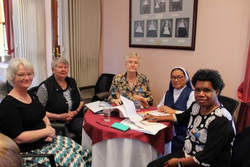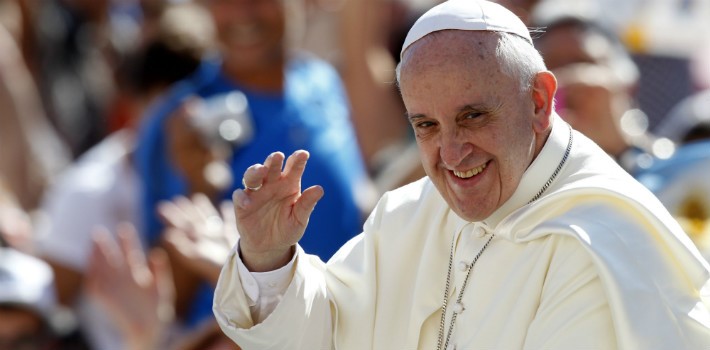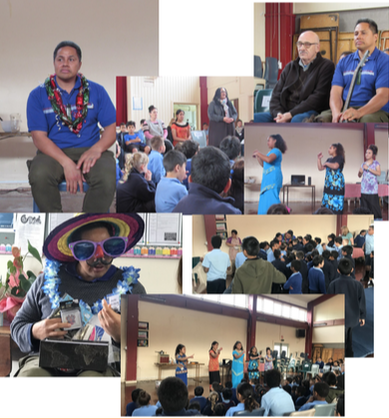|
Pope comes to Holy Trinity Parish by video and letter Last month Pope Francis was a regular presence in our parish, albeit by video. Pope nights at Holy Cross staffroom, St Anthony’s Gascoigne Room and St Patrick’s meeting room where great occasions for hosting Pope Francis on video. From footage of lightening striking the Vatican dome on the resignation of Pope Benedict, through to the miracles the new pope has performed and the Synod on Family, the videos showed an active Pope with an ability to communicate age old messages in new ways. Themes of the papacy of Pope Francis The name Pope Francis chose is very important to understanding his mission: he has embraced the mission of Francis of Assisi: to “rebuild” the Church in the sense of a spiritual reform that has God at its centre. One of the main messages of Pope Francis is the centrality of mercy. He is displaying mercy in his actions and words. The remarkable effect he has had on the non-Catholic world shows the power of this message. It is not that Pope Francis is seeking to strip us of our commitments to critical social causes like abolition of abortion or commitment to marriage and family, but that he wants us to move these important things to their proper place. To illustrate this, we can imagine a target with concentric circles and a centre bull’s-eye. The bull’s-eye would contain the single most important thing, and each ring out from the centre would reflect things that are in degrees of descending importance. This is at the heart of what Pope Francis is calling us to: He’s asking us to focus on the message in the centre of the bull’s-eye: “God created you for one purpose, an eternal relationship of love with Him.” Pope Francis wants us to lead with ‘yes’ – rather than with ‘no’. When we lead with ‘no’, our messages and means of communication not only fail to advance the cultural causes we care about, but they also are destructive to the souls of those who are not yet convinced that we have anything to say to them. Gaudete et Exsultate - Rejoice and be glad The theme of the latest papal letter is the call to holiness in today’s world. Pope Francis calls us all to be holy – he asks us to be inspired by the saints next door. We are all called to be holy by living our lives with love and by bearing witness in everything we do, wherever we find ourselves. According to Pope Francis, some characteristics of holiness in the current world are: patience and meekness, humour, courage and fervour, community life, and constant prayer. A woman who raises her children, a man who works to bring home the daily bread…this for me is ordinary holiness. We should not look to a perfect life without errors, but people whose lives may not always have been perfect, yet even amid their faults and failings they kept moving forward and proved pleasing to the Lord. This is a very personal letter written to each of us. As the Tablet put it holiness has come to…mean one of two things: either being so unwordly as to be hardly on the planet at all, or to have assumed an air of spiritual superiority that disdains lesser mortals more subject to the temptations of the flesh. In his audacious new apostolic exhortation Pope Francis has embarked upon a very personal definition of holiness that breaks through these blockages and turns these preconceptions upside down. Most Catholics would shy away from imagining holiness either as applying to themselves or as a serious aim in life and are probably not comfortable with being thought of as ‘religious’. Yet the call to holiness is universal, and the practice of it should be as natural and familiar as any good habit. The parent who cares lovingly for a child, the carpenter who deftly repairs a damaged wardrobe, the owner of a business who behaves honourably and conscientiously towards staff and their customers, indeed anyone who aspires to become the person God means them to be, is engaged in becoming more holy by virtue of it. Holiness is not remote from everyday life. It is the very stuff daily life is made of. Anyone can be a saint. The Pope’s letter is a remarkable document and could be regarded as this Pope’s spiritual masterpiece. A thousand sermons could be preached on it, and everyone in the congregation would instantly sense that the Pope is talking to them personally. There are two common problems we have in the Church – belief in our own intellect, and belief in our own will. The first problem is believing that because we have received certain information, we fully understand the will of God; the second problem, that we can save ourselves by our own actions; we end up worshiping our own abilities, rather than trusting God. Both problems are similar, because they seek to control our encounter with God, and they both display pride and a lack of trust in God - The spiritual experience of the encounter with God cannot be controlled. The path of holiness asks that we keep our lamps lit, as those who do not commit serious failures against the Law of God can nevertheless fall into a state of dull lethargy. This can lead to a corruption that is worse than the fall of a sinner, for it is a comfortable and self-satisfied form of blindness. Everything then appears acceptable. Discernment, then, is…an authentic process of leaving ourselves behind in order to approach the mystery of God, who helps us to carry out the mission to which he has called us, for the good of our brothers and sisters. Many thanks to Patricia O'Donnell for last month’s article on the influenza epidemic of early last century in our area including the story of Sister Chanel Burton. Thank you this month to Sister Judith Moroney for sharing her reflection on what being a Sister of Mercy has meant to her, first shared at Mass at Holy Cross on Vocation’s Day. Sister lives in our parish and spends much of her time in work connected with the Mercy leadership  Sister Judith Moroney (far left) with other Mercy Sisters from around the Asia-Pacific region Thank you Father Gregory for this opportunity to share my experience of call in my life as a Sister of Mercy. We are all called by God, both in our everyday lives and living, and in our life vocation. For me that is as a sister in Nga Whaea Atawhai o Aotearoa, Sisters of Mercy, New Zealand. When I was younger I had always believed I would work, get married and have kids. I remember the tension within me when my call was to something different. But, I knew I could never be at peace until I tried it out and I’m still here and very much at peace with that choice. This call to follow Jesus, to live the Gospel in a particular way and to be inspired by our Foundress Catherine McAuley who was both prayerful and active in helping and empowering the poor in Ireland, knowing God’s mercy in my life and wanting to share God’s mercy with others, has led me into many privileged experiences. Before I joined the Mercies I was a primary teacher and I continued in that, along with Reading Recovery for many years. I have taught secondary school. I have been involved as a spiritual director, in retreats and child care during prison visiting hours. I have been bursar and involved in new membership within the Congregation. I have lived a few years in both Tonga and Samoa and been in primary and secondary teaching and teacher development there. I am now on the leadership team. And yet I know there has never been anything I “do” in religious life that I couldn’t do outside it. The call has been in making Jesus central in my life, being part of a congregation whose members share my vision and motivation and who support me in this privilege to live out my vows of celibacy - loving freely, obedience – listening deeply to God, the world and earth; and poverty – living simply. Trying to live whakawhanaungatanga - right relationships with God, self, others, earth and those who have walked before us and given witness. Maybe you, your son or daughter, niece or nephew, granddaughter or grandson is discerning his or her direction and vocational call. For some this may be in religious life or priesthood. Let us keep those who are discerning their path in life in our daily prayer, that they may make the choice that will give them deep fulfilment by living where they are called. In any vocation - marriage, single life, religious life or priesthood, there will be ups and downs. But when we are living deeply where we are called by God, we will find that deeper peace. That peace and knowing that is there no matter what difficulties there are. That is how we find true happiness and fulfilment.
Holy Cross - This term we will have a health focus with our theme ‘Confidence in Thyself’. Students will be reflecting upon their personality and how their actions affect others. This will also cover themes of
relationships and inclusiveness. Students will also develop an understanding that our actions shape us as a church. For physical education, students will be engaged in Run, Jump and Throw developing techniques used in athletics.
8 Comments
|
SHARINGIf you have news and views to share please email them to: [email protected] Archives
December 2018
Categories |



 RSS Feed
RSS Feed